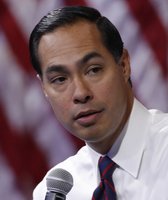Get PolitiFact in your inbox.

Jeb Bush at the Republican presidential debate in South Carolina. (Getty)
Jeb. Bush says there are no homeless veterans in Houston
At a campaign stop in West Palm Beach on Dec. 28, 2015, former Florida Gov. Jeb Bush answered questions about immigration, gun control and his candidacy for president.
After his speech to an audience of Florida Republicans at the Forum Club of Palm Beaches, Bush was asked, "If elected president, what would you and your administration do to improve veterans’ medical benefits?"
Bush said he would institute career civil service reform at the Veterans Administration, lead the VA to focus on "being world class for a few selected unique challenges veterans face" rather than providing all services, and give veterans more choices on where to go for their health care.
Then, Bush brought up his childhood home, Houston.
"Can I make another point? I want to tout something," he told the crowd. "Three months ago I was in Houston, Texas, and a guy who I met woke up one day and he said, ‘I do not want to see a homeless veteran on the streets of Houston.’ He’s a successful guy – he had the resources to draw people towards this cause.
"And in Houston, Texas, today, there are no homeless veterans," Bush said.
This program, Bush said, was an example of the effectiveness of "bottom-up government." "They didn’t wait for a federal government to create a program," he said of Houston. "They didn’t wait for Washington to do anything. They said, ‘This is the definition of who we are.’"
Houston was hardly alone in confronting homelessness among veterans. In 2009, as part of a broader initiative on homelessness, President Barack Obama announced a plan to end veteran homelessness nationwide by 2015 -- a goal that wasn’t entirely fulfilled, according to a June 2015 Houston Chronicle news story.
So, did Houston wipe out homelessness among veterans, even if the country didn’t? Bush made us wonder.
Effectively ending veteran homelessness
Although the federal government began its initiative on veteran homelessness in 2009, Houston didn’t begin its push in earnest until June 2012 with "Housing Houston’s Heroes," a program with the initial goal to house 100 homeless veterans in 100 days, according to staff in the Mayor’s Office for Homeless Initiatives.
Communities around the country tally their homeless populations with a "point-in-time count" each January. In January 2012, five months before it began targeting veteran homelessness, Houston counted 7,187 homeless residents, including 1,162 veterans. In January 2015, the city counted 4,609 homeless residents, including 563 veterans. The city has housed many of those veterans in the months since, but does not have a more recent count, according to the Mayor’s Office for Homeless Initiatives.
In January 2015, according to the U.S. Interagency Council on Homelessness, an estimated 47,725 veterans nationwide were homeless, down 36 percent since 2010, shortly after Obama declared the federal initiative. "Veterans experience homelessness for many of the same reasons that non-veterans do," the council says, but exposure to combat and repeated deployments as well as high rates of post-traumatic stress disorder, brain injury and sexual trauma among veterans can make homelessness more likely.
Generally, the U.S. Interagency Council on Homelessness defines ending homelessness as having "a systematic response in place that ensures homelessness is prevented whenever possible, or if it can’t be prevented, it is a rare, brief and non-recurring experience."
A Bush campaign spokeswoman, Allie Brandenburger, when asked the basis of Bush’s Houston claim, pointed us to news and advocacy articles including a list posted Dec. 7, 2015 by U.S. Uncut, a liberal advocacy group, naming Houston as one of seven cities and states that as of December 2015 were housing their chronically homeless veterans. The list was based on news reports and press releases from cities around the country on their work on homeless initiatives.
Bush’s camp didn’t answer our questions about Bush’s broader anecdote--particularly who he was singling out as the hero in his description of a "successful guy" who used his influence to stamp out homelessness for Houston’s veterans. When we inquired, Carl Salazar, director of Houston’s Office of Veterans Affairs, by phone said Bush’s story sounded "fictional." Salazar said Houston’s work on veteran homelessness brought together nonprofit groups as well as city, county, state and federal officials.
Brandenburger’s reply also noted December 2015 articles from the Christian Science Monitor, the Huffington Post and the Philadelphia Citizen that mentioned Houston as one of a handful of cities, including New Orleans, Salt Lake City, Philadelphia and Phoenix, that effectively had ended veterans’ homelessness.
Houston actions
For Houston, at least, reports of an end to veterans’ homelessness appear to have been based on then-Houston Mayor Annise Parker announcing in a June 2015 press release: "The Houston region has come together as a team to transform our homeless response system to effectively end veteran homelessness." The city celebrated the achievement at the time at a press conference where Parker was joined by three Cabinet secretaries who praised Houston’s work.
We wondered about the details. According to staff at the Mayor’s Office for Homeless Initiatives, the mayor’s mention of effectively ending veteran homelessness means the city had corralled the resources to house and prevent homelessness for veterans in need.
The program is focused on "permanent supportive housing," which uses grant funding from the U.S. Department of Housing and Urban Development to provide rental assistance for apartment units, according to Sean Quitzau, an assistant in the Mayor’s Office for Homeless Initiatives. The initiative works with the landlords who oversee these rental units, and allocates its resources to apartments, rather than shelters.
As of November 2015, the Houston program, renamed "The Way Home," had housed 4,114 veterans since 2012, Quitzau said. (Quitzau first checked with Mandy Chapman Semple, the special assistant to the mayor for homeless initiatives, who leads that office.) Houston, the fourth-largest city in the country, has the second-largest veteran population, with 300,000 veterans living there, the city said in its release. The initiative on veteran homelessness was a partnership between 35 local agencies.
‘No homeless veterans’
Houston officials agreed that "effectively" ending veteran homelessness by having the resources to house any veteran who needs assistance doesn’t mean that there are no homeless veterans in Houston.
Salazar, in the city’s Office of Veterans Affairs, confirmed that when we asked about Bush’s comments. "It’s true there are not that many homeless veterans on the streets of Houston," Salazar said by phone. "While it’s nice Jeb Bush touted all the work we’re still doing in Houston, it’s not true there are no homeless veterans here. There are definitely homeless veterans. It’s a moving target."
The Mayor’s Office for Homeless Initiatives, which tracks such statistics, couldn’t offer an exact number for how many veterans remain homeless. The office did say that 900 Houston veterans experience housing instability every year and 50 veterans at any given time are moving through the city’s system on their way to being housed.
Veterans who remain on the street, Salazar said, generally are there for up to three reasons:
-- Some choose to stay on their own, usually because they have lived in shelters before and do not like the structure of those environments, or object to assisted living they are required to have there.
-- Some don’t qualify for services because of prior offenses or records as sex offenders, usually for offenses that occurred after they completed military service. For the homeless with histories as sex offenders, even if they do qualify for services, it can be hard to get a landlord’s approval to be placed in an apartment complex. And veterans who were discharged from the military with bad conduct may not qualify for some of the VA services available, though a bad conduct discharge generally will not disqualify a veteran from all services for the homeless.
-- And some who fall into homelessness for the first time, rather than being chronically homeless, aren’t aware of the resources available and fall through the cracks.
Our ruling
Bush said that "In Houston, Texas today, there are no homeless veterans."
Houston is one of a handful of cities nationwide that have "effectively" ended veteran homelessness by revamping their resources and systems to handle all veterans who seek support. The city’s success in that regard has been measured by benchmarks set by national and local initiatives on homelessness.
Being equipped to provide housing for all homeless veterans doesn’t mean that every veteran is housed. Some remain homeless in Houston, whether by choice, a lack of awareness of housing resources or eligibility.
We rate Bush's statement Mostly False.
Mostly False: The statement contains an element of truth but ignores critical facts that would give a different impression.
Our Sources
Video, "Jeb Bush Forum Club Full Speech Florida," Dec. 28, 2015 (accessed Jan. 6, 2016)
Article, "Jeb Bush rallies South Florida loyalists, ahead of New Hampshire push," Miami Herald, Dec. 28, 2015 (accessed Jan. 6, 2016)
Email interview with Allie Brandenburger, communications, Bush presidential campaign, Jan. 5, 2016
Phone interview with Carl Salazar, director, Houston Office of Veterans Affairs, Jan. 6, 2016
Phone and email interviews with Sean Quitzau, assistant, Houston Mayor’s Office for Homeless Initiatives, Jan. 6, 2016 and Jan. 14, 2016
Email interview with Liz Osborn, press liaison, United States Interagency Council on Homelessness, Jan. 12, 2016
Press release, "Houston Effectively Ends Veteran Homelessness," Mayor’s Office, June 1, 2015 (accessed Jan. 6, 2016)
Article, "These 7 Cities and States Housed All Their Chronically Homeless Veterans," U.S. Uncut, Dec. 7, 2015 (accessed Jan. 6, 2016)
Article, "An end to homelessness: Cities take on ‘impossible’ challenge," Christian Science Monitor, Dec. 20, 2015 (accessed Jan. 6, 2016)
Article, "How A County Outside DC Basically Ended Homelessness For All Vets," Huffington Post, Dec. 23, 2015 (accessed Jan. 6, 2016)
Article, "How Philly Beat Veteran Homelessness," the Philadelphia Citizen, Dec. 21, 2015 (accessed Jan. 6, 2016)
Report, "Opening Doors," United States Interagency Council on Homelessness (accessed Jan. 6, 2016)
Article, "Houston recognized for program that helps homeless veterans," Houston Chronicle, June 1, 2015 (accessed Jan. 6, 2016)
List, "Mayors Challenge," HUD.gov (accessed Jan. 6, 2016)
Browse the Truth-O-Meter
More by Emma Hinchliffe
Jeb. Bush says there are no homeless veterans in Houston
Support independent fact-checking.
Become a member!
In a world of wild talk and fake news, help us stand up for the facts.















































